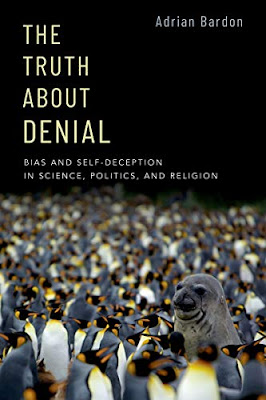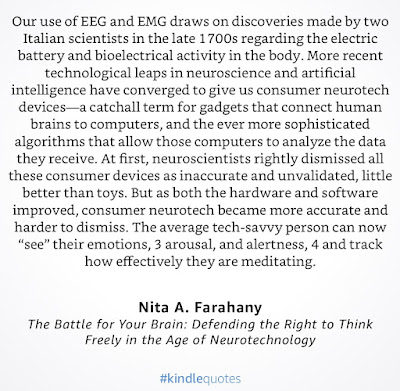Just finished another excellent read.
 |
| Click cover image |
Of late, observers of the U.S. political landscape have been commenting more and more on the alarming ways in which Americans of different political persuasions and cultural, racial, and other identity groups seem not just to disagree on issues but also to be living in different realities. One area where this situation has significant consequences is in the way people can interpret reports of scientific consensus differently, depending on their prejudices and allegiances. Different people, for example, may hear about the science on the human causes of climate change and—sincerely—perceive either certainty, uncertainty, or outright hoax. This phenomenon undercuts public discourse on matters where public policy grounded in solid science has never been more essential.
This phenomenon is on a continuum with the way in which different people can look at those living in poverty, and see them either as victims of unfair circumstances or as people who are complicit in a culture of irresponsibility and dependency. Different people will consider a given refugee population, and see either an alien threat to our way of life or deserving potential members of our society. Different people will see a video of a police shooting; some will see justification and others will see murder.
An environment of polarization, prejudice, bias, and willful self-deception, combined with an often misleading political and media environment, is toxic for political discourse. Polarization on matters of fact is affecting progress on matters of critical public importance, such as action on climate.
Research on denial has exploded over just the last few years. This includes game-changing work from social, political, cognitive, and evolutionary psychology, as well as from sociology, communication studies, political science, history, and philosophy. My goal has been to bring this diverse work together for the reader while, I hope, convincing readers of the urgent importance of gaining a better understanding of unconscious bias and self-deception. Denial concerns all of us—both as victims and as perpetrators—and so this work is intended not just for an academic audience; it is for everyone.
Adrian Bardon. The Truth About Denial. Oxford University Press. Kindle Edition.
The author nailed it. Great scholarly writing style, leavened with numerous LMAO moments.
File this one under "Deliberation Science." Also, see "The Big Myth." And, "Trust The Plan." Lots to ponder.
The purpose of this book is to examine the pervasive human tendency to deny uncomfortable truths and to discuss how this tendency affects public discourse—as well as private life—on an exceedingly wide range of important topics. The phenomenon of denial, as we shall see, is dependent on motivated cognition. “Motivated cognition” refers to the “unconscious tendency of individuals to process information in a manner that suits some end or goal extrinsic to the formation of accurate beliefs.” Motivated cognition happens behind the scenes, but is closely tied to the more overt rationalization of belief, which I shall define as the process of retroactively inventing defensive justifications for holding those beliefs formed via motivated cognition. Motivated cognition is about belief formation, whereas rationalization is about maintaining and defending beliefs. Rationalization is thus a kind of second stage for motivated cognition. Unlike motivated cognition, explicit rationalization is a conscious process, though we are often not consciously aware of our motives when we engage in it. (I shall use the familiar phrase motivated reasoning—the popular use of which doesn’t generally distinguish between initial motivated cognition and the second-stage rationalization of that way of thinking—to denote the whole process wherein implicit, motivated cognition is followed by the generation of spurious reasons to maintain those sincerely held beliefs formed via motivated cognition.)
Let’s get a little clearer on exactly what “denial” does and does not include, for purposes of this discussion. It does not refer, for instance, simply to being misinformed. I wish to examine denial strictly in that sense of being “in denial” wherein the denier is exhibiting a kind of emotionally self-protective self-deception. (Denial is often misattributed to ignorance; as I shall discuss further, there is good reason to think that the real issue is motivated reasoning.) Denial, in this context, presumes some exposure to relevant—and unwelcome—facts and constitutes a kind of reaction to them. This sort of self-deception is different from mendacity, wherein one purposefully lies to others about the existence of evidence for something, or deliberately misrepresents the evidence. One might know perfectly well, for example, that one’s oil company is responsible for a toxic spill, and respond by actively and consciously engaging in a cover-up and public denial of responsibility.
Neither am I talking about “spin,” or what philosopher Harry Frankfurt has termed bullshit. The bullshitter’s intent is not to lie but, rather, to influence or to create a certain reality, and is simply indifferent as to whether his or her claims are true or false. The job of the trial attorney, the political operative, or the commercial advertiser is neither to uphold the truth nor to lie; rather, the job is to represent one’s client in the best light possible.
Being in denial is also to be distinguished from wishful thinking. What wishful thinking has in common with denial is that each fulfills an emotional need of some kind. However, with wishful thinking, there is a belief without solid evidence for a conclusion one way or the other… [Adrian Bardon, pp. 4-5].
CONTENTS
Preface
Acknowledgments
Acknowledgments
1. Bias and Belief
1.1 What Is Denial?2. Science Denial
1.2 “Hot Cognition”
1.3 Mechanisms of Motivated Reasoning
1.4 The Origins of Denial
1.5 Pathological Ideology, and Denialism as a Social Phenomenon
2.1 Climate Science Denial3. Pride, Prejudice, and Political Economy
2.2 Personality, System, and Status Quo
2.3 The Asymmetry Thesis
2.4 Science and Societal Change
3.1 Political Economics4. Religion
3.2 Poverty and the Fundamental Attribution Error
3.3 Classism and Racial Stereotyping
3.4 The Liberty Argument
3.5 Asymmetry Again
4.1 Reasons to BelieveAfterword: Directions for Science Communication
4.2 Is It Even a Belief?
4.3 The Origins of Religiosity
4.4 Tenacity
4.5 The Problem(s) with Religion
4.6 The Retreat into Abstraction
A.1 More Information?Index
A.2 Message Framing and Delivery
You might find some of his conclusions a bit counterintuitive at first blush, but his evidence is fairly compelling. Uhhh... "Evidence?" Define "evidence."
I have by now studied and reviewed dozens of books on the operational sciences, philosophy of science, science communication, etc. on this blog, and while the word “evidence“ has shown up thousands of times thus far (I always do searches of keywords and phrases), I have yet to encounter a writer providing a definition of the term. I find that sadly telling. We mostly tend to assume that we all have the same general understanding of key words. Adrian, to his credit, at least points out that, on hot-button issues, partisans tend to deploy opposing ideological interpretations of key definitions. These tangential wafts of “No True Scotsman“ fallacy just muck things up.
Stay tuned.
_____
ON DECK
This was reviewed in my latest Science Magazine—"Achieving Cognitive Liberty"
In her latest book, The Battle for Your Brain, neuroethicist and law professor Nita Farahany warns readers that neurotechnology—technology designed to monitor or manipulate the human nervous system—can “either empower or oppress us.” Farahany generously illustrates how such technologies, which range from monitoring tools such as functional magnetic resonance imaging and the electroencephalogram (EEG) to techniques that can alter brain function, such as deep brain stimulation and transcranial magnetic stimulation, are affecting our lives. But The Battle for Your Brain is, above all, a call to expand human rights to include “cognitive liberty,” a right articulated in 2004 by Wrye Sententia as our “autonomy over [our] own brain chemistry”…
Farahany ends her analysis by inviting readers to join the debate about the benefits and risks of various transhumanist proposals. These include postmortem brain cryopreservation, the expansion of human senses through brain–computer interfaces, brain-to-brain communication, brain-to-text messaging, and the use of brain implants to inactivate pain and suffering.
In The Battle for Your Brain, Farahany calls for “prudent vigilance and democratic deliberation” regarding the social repercussions of neurotechnology. The book is valuable reading, not only for those interested in neuroscience but also for anyone genuinely concerned about the challenges humanity will face in the near future.
I'm confident that this too will be excellent.
UPDATE
 |
| Click the article. |
UPDATE
Neurotech’s Battles Impact Our Brains’ FutureBTW: I finished her book today (Mar 28th). A lot to assimilate. More to come...
Mental sovereignty, says author Nita Farahany, is no longer a given
________




No comments:
Post a Comment